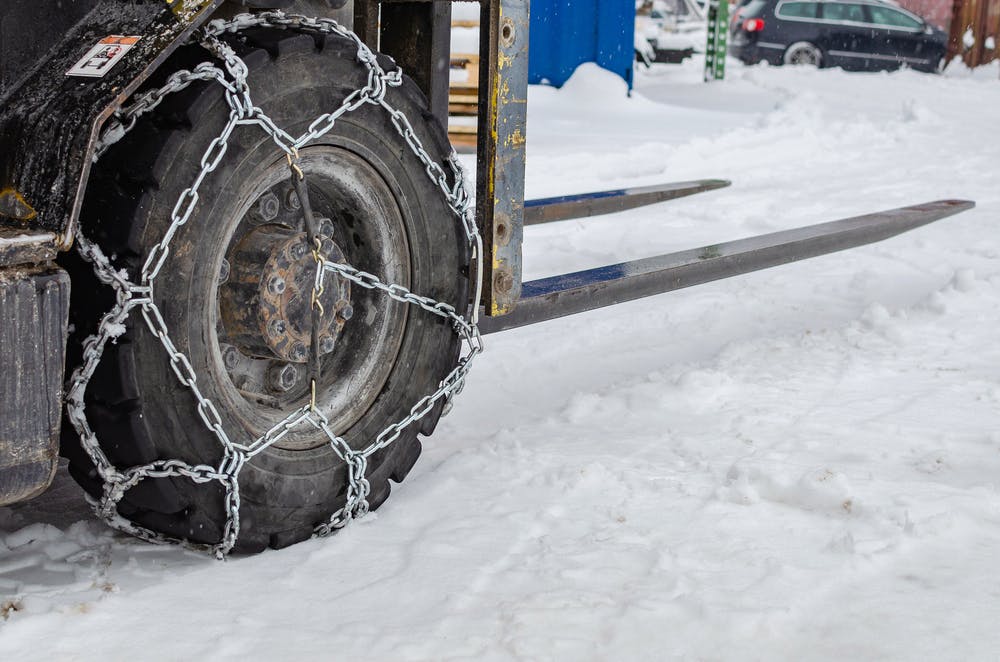When not in use
Proper protection when storing a forklift is just as important as taking precautions when in operation, ensuring that the integrity of the vehicle is maintained, but also to ensure a smooth start to the working day.
A general rule at any time of year when it comes to forklifts is to make sure that each forklift has had its annual service, as well as being subjected to regular inspections. However, checks should be ramped up during the winter months, as freezing temperatures can result in more issues that should be spotted and resolved quickly.
If your facility has the space for it, all forklifts should be stored in a dry area when not in use, as excess moisture can severely compromise the moving parts of the vehicle.
Finally, if you use diesel operated forklifts, make sure that the diesel you are using is equipped to handle freezing temperatures, as when standard diesel is exposed to these kinds of conditions, it can freeze or can trigger a process known as gelling, which involves the waxes in the fuel crystallising, resulting in a solid form. Additives can be purchased to prevent this, but the preferred solution will always be proper storage of your forklifts. In addition to the appropriate fuel, high quality hydraulic fluid should always be used to ensure the safe and efficient operation of each of your forklifts.
Before use
When operating a forklift, you now must consider the integrity of the vehicle, as well as the safety of the operator.
Before an operator even starts up a forklift, it is important to check that the area has been appropriately gritted, preferably before any snow or ice is predicted to hit, and keep any areas consistently gritted throughout the spell of inclement weather. This will reduce the risk of not only vehicles slipping on the ice, but will increase the safety of operators when making their way around the facility, as well as when entering and exiting the forklift.
One of the most important factors to alter when it comes to the operation of a forklift is the tyres, with pneumatic tyres highly recommended over the standard models. Pneumatic tires are designed to absorb the impact of uneven surfaces, and their thicker tread provides better traction in slippery conditions.
If these types of tyres are not suitable for the types of forklifts you use, there are other alternatives that can be installed on to any existing forklift tyres such as tyre chains and studs to achieve a similar effect.
Even in more pleasant weather, it is important that oil and fuel levels are monitored and topped up when necessary, but when it comes to wintry conditions, de-icer levels will also need to be monitored extremely closely.
The final factor to consider before an operator commences the use of a forklift, is allowing adequate time for the vehicle to warm up, which will allow optimal performance of the engine and hydraulics.

During use
The recommendations surrounding forklift safety in these conditions not only benefit and protect the operators, but those in the surrounding area too.
Operative should take extra care when operating forklifts in these sorts of conditions in a number of ways, including reducing speed and being extra vigilant when it comes to your surroundings. This can apply both to watching out for particularly slippery or uneven surfaces, as well as watching out for pedestrians and colleagues, with snow or even wind and rain possibly causing visibility issues for both parties involved.
After use
When the operator is finished using the forklift, on top of proper storage procedures previously mentioned, it is important that the vehicle is thoroughly cleaned, as a build up of dirt or even gritting salt becoming lodged in the tyres of any mechanisms will affect the functionality and even safety of the vehicle when used in the future.
Forklifts are a vital part of many commercial operations, and many of these operations are required to continue functioning to an acceptable standards in all types of weather. Therefore, it is important that all staff, particularly operators are aware of the extra care and attention to detail needed when it comes to forklift operation in challenging conditions.